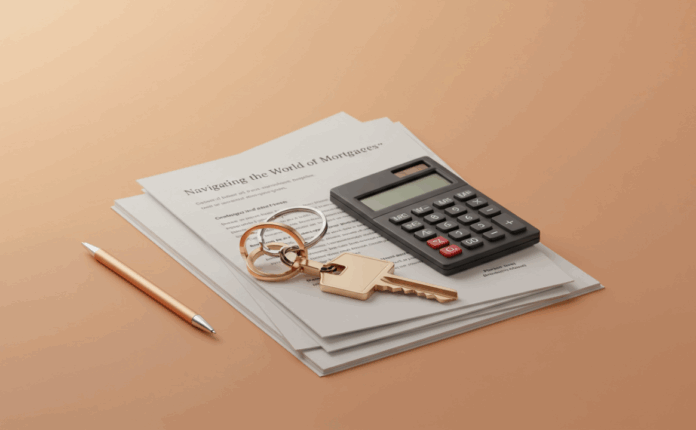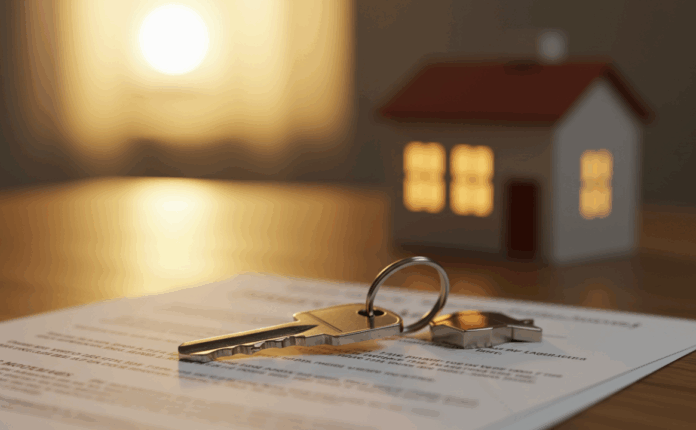When it comes to purchasing a home, navigating the world of mortgages can feel like walking through a maze. For first-time homebuyers or those with less-than-perfect credit, an FHA loan often emerges as a beacon of hope. But what exactly is an FHA loan, and can it truly serve as a viable mortgage option? In this article, we’ll break down the essentials of FHA loans, explore their benefits and limitations, and help you decide if this government-backed financing option aligns with your homeownership goals. Whether you’re dreaming of a cozy starter home or seeking clarity on mortgage options, this guide is designed to inform and inspire confidence in your decision-making process.
What is an FHA Loan?
Understanding the Basics
An FHA loan is a mortgage insured by the Federal Housing Administration (FHA), a division of the U.S. Department of Housing and Urban Development (HUD). Designed to make homeownership more accessible, FHA loans are particularly appealing to first-time buyers, low- to moderate-income individuals, and those with lower credit scores. Unlike conventional loans, which private lenders issue without government backing, FHA loans offer more lenient qualification criteria, making them a popular choice for those who might not qualify for traditional financing.
The FHA doesn’t directly lend money to borrowers. Instead, it provides insurance to lenders, thereby reducing their risk in the event of a borrower defaulting on the loan. This insurance enables lenders to offer more favorable terms, including lower down payments and more flexible credit requirements. FHA loans can be used to purchase a primary residence, including single-family homes, multi-family properties (up to four units), condominiums, and certain manufactured homes, as long as they meet FHA property standards.
A Brief History of FHA Loans
Established in 1934 during the Great Depression, the FHA aimed to stabilize the housing market by encouraging homeownership and protecting lenders from widespread defaults. Over the decades, FHA loans have evolved to address modern housing needs, helping millions of Americans achieve the dream of owning a home. Today, FHA loans remain a cornerstone of affordable housing initiatives, offering a lifeline to borrowers who might otherwise be excluded from the market.
How Does an FHA Loan Work as a Mortgage?
Using an FHA Loan for Home Financing
Yes, an FHA loan can be used as a mortgage to purchase a home! It functions similarly to a conventional mortgage, with monthly payments that include principal, interest, taxes, and insurance. However, what sets FHA loans apart is ireir structure areqrequirementsh which make them more accessible. Borrowers apply through FHA-approved lenders, such as banks, credit unions, or mortgage com;anies, and the FHA’s insurance program backs the loan.
Once approved, borrowers can use an FHA loan to finance a primary residence, meaning the home must be the principal place of living. The loan covers the purchase price of the property, minus the down payment, and is available with either fixed or adjustable interest rates. Fixed-rate FHA loans are particularly popular because they provide predictable monthly payments, which is ideal for budgeting, especially for first-time buyers.
Key Features of FHA Loans
FHA loans come with several distinctive features that make them attractive fspecificain borrowers:
- Low Down Payment: One of the most appealing aspects of an FHA loan is the low down payment requirement, which can be as little as 3.5% of the purchase price for borrowers with a credit score of 580 or higher. For example, on a $200,000 home, that’s just $7,000—significantly less than the 20% often required for conventional loans.
- Flexible Credit Requirements: FHA loans are more forgiving of past credit challenges. Borrowers with credit scores as low as 500 may qualify, though a 10% down payment is required for scores between 500 and 579.
- Competitive Interest Rate: Since the FHA insures these loans, lenders often offer competitive interest rates, which can be lower than those for conventional loans.
- Mortgage Insurance Premiums (MIP): FHA loans require two types of mortgage insurance: an upfront premium (typically 1.75% of the loan amount) and an annual premium, which is paid monthly. This insurance protects lenders but adds to the borrower’s costs.
- Debt-to-Income Ratio Flexibility: FHA loans allow higher debt-to-income (DTI) ratios, often up to 43% or higher in some cases, making it easier for borrowers with existing debts to qualify.
Benefits of Choosing an FHA Loan
Accessibility for First-Time Buyers
For many first-time homebuyers, the low down payment and lenient credit requirements of FHA loans are game-changers. Saving for a 20% down payment can take years, especially for younger buyers or those in high-cost housing markets. An FHA loan’s 3.5% down payment requirement allows buyers to enter the market sooner, turning the dream of homeownership into reality without draining their savings.
Support for Lower Credit Scores

If your credit history has a few blemishes—say, a missed payment or two—an FHA loan might still be within reach. The ability to qualify with a credit score as low as 500 is a significant advantage, especially for those rebuilding after experiencing setbacks such as medical debt or job loss. While lower credit scores require a higher down payment, the opportunity to secure a mortgage is a powerful incentive.
Flexible Debt-to-Income Ratios
FHA loans are also forgiving when it comes to debt. If you have student loans, car payments, or credit card debt, the FHA’s higher DTI ratio allowances mean you’re more likely to qualify compared to conventional loans. This flexibility is beneficial for younger borrowers or those in early career stages who may have significant debt but a stable income.
Limitations of FHA Loans
Mortgage Insurance Costs
One of the most significant aspects of FHA loans is the requirement for mortgage insurance premiums (MIP). Unlike conventional loans, where private mortgage insurance (PMI) can sometimes be canceled once you build sufficient equity, FHA loans typically require MIP for the life of the loan unless you make a down payment of 10% or more. This ongoing cost can add hundreds of dollars to your annual expenses, making FHA loans more expensive over time.
Property Standards and Inspections
FHA loans come with strict property requirements to ensure the home is safe, sanitary, and structurally sound. While this protects buyers from purchasing a home in poor conditionlimit ourcondition, it also limits the purchase ofomes in need of significant repairs may not qualify unare addressed before closing. Additionally, the FHA appraisal process is more rigorous, which can complicapurchase ocomplicate the purchase process have maximum loan limits that vary by region, based on local housing costs. In 2025, the FHA loan limit for a single-family home in most areas is $498,257, but it can be higher in high-cost areas (up to $1,149,825). If you’re eyeing a luxury home or live in a pricey market, an FHA loan may not cover the full purchase price, requiring you to explore other financing options.
Who Should Consider an FHA Loan?
Ideal Candidates
FHA loans are best suited for first-time homebuyers, those with limited savings, or individuals with lower credit scores who might struggle to qualify for conventional loans. If you’re ready to buy a primary residence but don’t have a large down payment or a stellar credit history, an FHA loan could be a perfect fit. It’s an excellent option for buyers in competitive markets where saving for a 20% down payment feels out of reach.
When to Look Elsewhere
If you have a strong credit score (above 700), substantial savings for a down payment, or are purchasing a high-value property that exceeds FHA loan limits, a conventional loan might be a better choice. Similarly, if you’re buying a fixer-upper or an investment property, FHA loans won’t be suitable due to their strict property and occupancy requirements.
How to Apply for an FHA Loan
Steps to Get Started
Applying for an FHA loan is straightforward, but it rerequires thorough preparation and planningHere’s a step-by-step guide:
- Check Your Credit Score: Review your credit report to ensure it is accurate, understand your current standing, and note that a score of 580 or higher qualifies you for the 3.5% down payment.
- Find an FHA-Approved Lender: Not all lenders offer FHA loans, so research banks, credit unions, or mortgage companies approved by the FHA.
- Gather Financial Documents: Be ready to provide proof of income (pay stubs, W-2s), tax returns, bank statements, and details about your debts.
- Get Pre-Approved: Pre-approval strengthens your offer when shopping for a home and gives you a clear budget.
- Shop for a Home: Work with a real estate agent to find a property that meets FHA standards and fits within loan limits.
- Complete the Appraisal and Underwriting: The lender will order an FHA appraisal to ensure the home meets the safety and quality standards set by the FHA. Underwriting confirms your financial eligibility.
- Close on Your Home: Once approved, you’ll sign the loan documents, pay closing costs (which can be 2-6% of the loan amount), and move into your new home.
Tips for Success
To improve your chances of approval, pay down existing debts to lower your DTI ratio, save for the down payment and closing costs, and avoid major purchases or new credit lines during the application process. Working with an experienced lender familiar with FHA loans can also streamline the process and address any challenges.
FAQs About FHA Loans
What is the minimum credit score for an FHA loan?
The minimum credit score for an FHA loan is 500. However, borrowers with scores between 500 and 579 are required to make a 10% down payment, while those with scores of 580 or higher can qualify with a 3.5% down payment.
Can I use an FHA loan for a second home or investment property?
No, FHA loans are only available for primary residences. You cannot use them to purchase vacation homes or investment properties.
How much are FHA loan closing costs?
Closing costs for FHA loans typically range from 2% to 6% of the loan amount. These costs include appraisal fees, title insurance, and lender fees, and can sometimes be rolled into the loan or covered by seller concessions.
Do FHA loans have higher interest rates?
FHA loans often have competitive interest rates, sometimes lower than conventional loans, due to the government backing that reduces lender risk. However, the addition of mortgage insurance premiums can increase the overall cost.
Can I refinance an FHA loan?
Yes, FHA loans can be refinanced through options like the FHA Streamline Refinance, which simplifies the process for existing FHA borrowers, or a conventional refinance if you qualify for better terms.
Conclusion
An FHA loan is a powerful tool for aspiring homeowners, offering a pathway to homeownership with lower barriers than conventional mortgages. With its low down payment, flexible credit requirements, and competitive interest rates, it’s an excellent option for first-time buyers or those with modest financial resources. However, the added cost of mortgage insurance and property restrictions mean it’s not the right fit for everyone. By understanding the ins and outs of FHA loans, you can make an informed decision about whether this mortgage aligns with your homebuying goals. Ready to take the next step? Connect with an FHA-approved lender to explore your options and start your journey toward owning a home.



